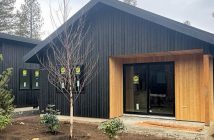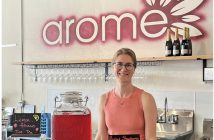Many outside Madras may be surprised to find a multi-million dollar manufacturing company, but KEITH Mfg. Co. has called the town home for the past 50 years. The company, which has five international locations, sells its industrial automatic unloading system throughout the world. Units are made for installation in both trailers and stationary bins and are used in the waste, recycling, agriculture and renewable energy industries.
KEITH’s signature product, the Walking Floor conveyor, is a moving floor consisting of reciprocating slats that “walk” the material off the end.
Established in 1962 by Keith Foster, the business is now managed and owned by his son Mark Foster and Mark’s two daughter’s Lindsay Foster-Drago and Melissa Henning. Both Lindsay and Melissa’s husbands work in the operation, so this is truly a family affair.
I recently sat down with Mark and Lindsay, who shared the changes they have made to adapt to current economics.
CBN: Let me begin with the question that comes to everyone’s mind, why Madras? How did
this happen?
Mark: Because this is where my father came in 1950. Before 1982 we were primarily agriculture based and then we entered the solid waste industry and our sales sky rocketed. This is not the best location for us, but this is where we started and it has worked for us. We are at least 3,000 miles from our biggest market, the
east coast.
CBN: You have a 40 million dollar business showing a 15 percent yearly growth rate this year and last. How is that happening in this economy?
Mark: The economy impacted us as well. The first year our sales declined by 40 percent. The transport industry as a whole went down 50 percent. New tax incentives that allow businesses to depreciate 100 percent of equipment costs have worked in our favor.
We started realizing there was a problem in July 2008. I was traveling in Canada and visited one of our largest customers. The customer had virtually no orders. I called my office from Canada and told my management team here that we would need to downsize and probably do it quickly. We cut back quite a bit in terms of personnel before the economy went into full decline.
CBN: That was fortuitous.
Mark: If I hadn’t seen it for myself firsthand I probably would not have reacted so quickly.
CBN: So cutting back in personnel was your first step?
Mark: Yes, we went from 210 down to an equivalent of 85 employees in a 40 hour work week. The number of personnel was actually 120, but we cut hours and went on what’s called “work share.”
Lindsay: We were concerned about losing all that knowledge and such a good team. “Work share” allowed us to keep more employees.
CBN: How did you determine who stayed?
We have a system we call “TIPP,” which we used in our evaluation. Are they a team player, do they have integrity, are they a problem solver and do they have a positive attitude. If they had all those things we kept them. We completed this by December 2008. By May of 2009 we were lobbying the state legislature to extend the “work share” program. What recession lasts six months? Prior to our lobbying efforts that was the length of “work share.”
Our company along with others like Structus of Bend worked with the legislature, through State Representative John Huffman and Congressman Greg Walden, to change the work share program. It made sense to us, instead of paying all this unemployment why not work it out so people can work part time and still have a job? It worked out for us because we didn’t have to lay off more people.
When we first started “work share” there were about 80 companies using “work share” and by the time we got out of it there were over 400 companies using it in the state of Oregon. There were a lot of people in the same boat.
CBN: In walking the plant I see a lot of systems in place.
Mark: Yes we focus on “lean manufacturing.”
CBN: Could you explain that term.
Lindsay: It’s a process of manufacturing where you look for ways to eliminate waste and seek continual improvement. We’ve done a lot of things with other companies in and outside of Central Oregon for information sharing to enhance our “lean manufacturing.”
It’s something we work at. In the past my grandpa was very private, because most of his customers and suppliers were out of the area. What we have realized is there are a lot of companies doing some really cool things. We work a lot with Structus, which makes dry wall corners for housing and reinforcing doors in construction. We both attend each other’s improvement events.
CBN: What is an improvement event?
Lindsay: It’s where we take a process and look at something that needs to be improved. We think how can we improve and ask our people how we can make their job better/easier. The most valuable thing is bringing in other people doing similar work in other companies. They learn how to evaluate a process and they bring new ideas to us for our process.
CBN: Are you affiliated with them in some way?
Lindsay: No we are completely unrelated to them.
We’ve done the same thing with a company in Newberg, Climax Portable Machine Tools and A-dec, which is a large dental manufacturer in Newberg.
CBN: How do you connect with these other companies?
Lindsay: There are organizations for companies willing to share “best practices.” There is an organization called HiDEC in Central Oregon and that’s how we met other organizations like Ruff Wear and Deschutes Brewery.
HiDEC is part of EDCO. I’m on the board of Economic Development of Central Oregon for Jefferson County and next year the Vice President. Through that organization we’ll hear about a company having challenges with an issue, such as receiving. We may be struggling with receiving too, so we’ll talk with the owner of that company to consider brainstorming together. I think that’s really valuable. You don’t have to be a big company or even a manufacturing company. We’ll do things with other non-manufacturing companies, including suppliers. Today we have a supplier having a difficult time counter sinking holes for us in the metal we are buying from them. They came to our team to ask how they can error proof the process. Our teams are brainstorming to help the supplier get a 100 percent accurate product every time.
Mark: We also had our first supplier lean day last year to teach our suppliers about visual controls and improving flow. We want them to implement the same things we’re doing, because we’re depending on them to deliver on time with quality. If we teach them about what we are doing here then hopefully they get ideas or give us new ideas to implement.
Another thing I have done is set up a book club where each member of the team reads a book and reports on a chapter every week. It’s optional and I pay them for their time. Afterward they come back with recommendations for improvement.
CBN: It sounds like you have a large focus on “Team.”
Lindsay: I think the biggest impact the book club has had is making people more focused as a team bringing new ideas to our process. We also put out a monthly newsletter to give the team members a communication tool that focuses on team members and promoting lean leadership. We mainly feature a customer or team member and include internal awards, internal openings, improvement events. We even have a “lean” crossword puzzle for learning terminology. The newsletter is informative and fun.
CBN: What is driving your success?
Lindsay: One of the things is one-on-one selling. We try to pull sales through the end users. Direct selling to the end users brings sales to our distributors.
Mark: The reason we do this is we know we have the best products on the market, but the customers are going to have to pay more for it. If we don’t convince the end user that our products are worth more, they aren’t going to buy them. They are going to buy the cheapest.
Lindsay: My grandpa’s philosophy was always solve the end users’ problems and then they will always request our system. One of our main competitive advantages is how we sell by creating demand for the products. I think the combination of that type of selling, plus innovative products that are completely distinctive to KEITH is the combination that creates our success.
CBN: Were there any benefits to this recession?
It redefined our business. We now have the best team we have ever had. We changed our hiring practices. Changed testing screening and went to team interviews. We restructured the organization, changing our manufacturing process and R&D.
CBN: What are your long term goals for the company.
Mark: One is that we are trying to build a unified team worldwide. Also we are trying to be the premier provider in material handling. My goal is to grow the
company tenfold.
That’s a lofty goal, but after meeting the family I wouldn’t underestimate them. They are self-funded with a vast amount of talent on their team. What impressed me the most was their willingness to learn and redefine operations. KEITH is the number one manufacturer in the moving floor machinery market. Number one, yet they know they don’t know it all, very impressive.
If you would like to share your “Booming in Central Oregon” experience with our community contact Elizabeth at eueland@hotmail.com.
www.keithwalkingfloor.com 401 NW Adler St., Madras, 541-475-3802.




